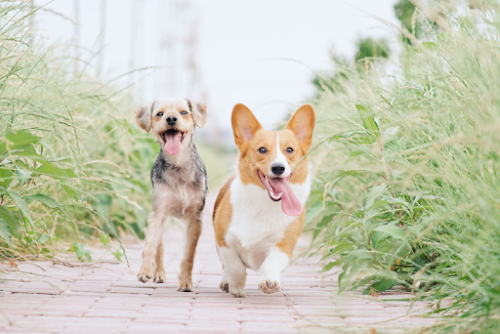If your dog’s bad breath is putting you off doggy kisses, then this article is here to save the day! Read on to find out what causes bad breath in dogs, and what you can do to prevent it, and treat it so you can go back to smooching your pooch.
What Causes Bad Breath?
Bad breath in dogs is most commonly caused by poor oral hygiene. Did you know, 80% of dogs over 3 years of age suffer from some kind of dental disease. That is a staggering number! Dental disease, also known as periodontal disease, is caused by a buildup of plaque on the tooth surface, and leads to inflammation around the tooth and gums. Food, saliva and bacteria can lead to a buildup of plaque on the teeth and if not removed, turn into a hard calcification called tartar. As well as bad breath, you may also notice your dog has discoloured teeth, inflamed or bleeding gums, difficulty eating, loose teeth or excessive drooling.
If your dog’s breath smells like urine, this could indicate that they are suffering from kidney disease. Their breath can also smell like chemicals or ammonia.
Figured out the Cause? Now it's Time to Treat and Prevent it
Bad breath in dogs for any reason is always worth a trip to the vet to rule out any underlying health issues. If it is dental disease that is causing your dog’s bad breath, your vet may suggest having your dog’s teeth cleaned under anaesthetic. After this procedure, it is important to keep your dog’s teeth looking pearly white to prevent a further buildup of plaque or tartar.
Brushing your dog’s teeth is the best way to keep them clean, but if you have never brushed your dog’s teeth before, you might have a hard time starting when they are a bit older. We sell a range of specialty toothbrushes and toothpaste from brands including Dentipet, Pet-Rite, Petosan, Prozym and Triple Pet.
Specially formulated food and treats are also great for helping to reduce the buildup of plaque in between brushing. We stock specialty dental foods from Royal Canin, Advance and Hill's Prescription Diet and Science Diet. We also stock Greenies, Pedigree Dentastix, Evolution Dental Chews and Prozym Dental Sticks.
Giving your dog a raw bone is another great way to keep their teeth healthy. Never give your dog a cooked bone as they can easily splinter while being chewed leading to a very expensive vet visit.
Dental toys and water additives are also useful at preventing the buildup of plaque in your dog’s mouth. We stock Kong Dental toys, Fido Superflex bones and Aquadent water additive.
If your dog is rummaging through your rubbish, move the bin to a location where they cannot reach it or choose a bin that is harder for them to get in to. As for the poop, if it is cat poop they fancy, move your cat’s litter tray to an area they cannot access or choose a covered litter tray to keep them out.
A dog that eats their own poop is in need of a trip to the vet to rule out any medical reasons that may be causing this behaviour. It can also be caused by stress or anxiety which your vet can help you manage.
If you have noticed that your dog’s breath is sweet or smells fruity or maybe it smells like urine or ammonia, a trip to the vet is definitely on the cards. Both diabetes and kidney disease should be diagnosed and managed by your dog’s veterinarian.











0 comments